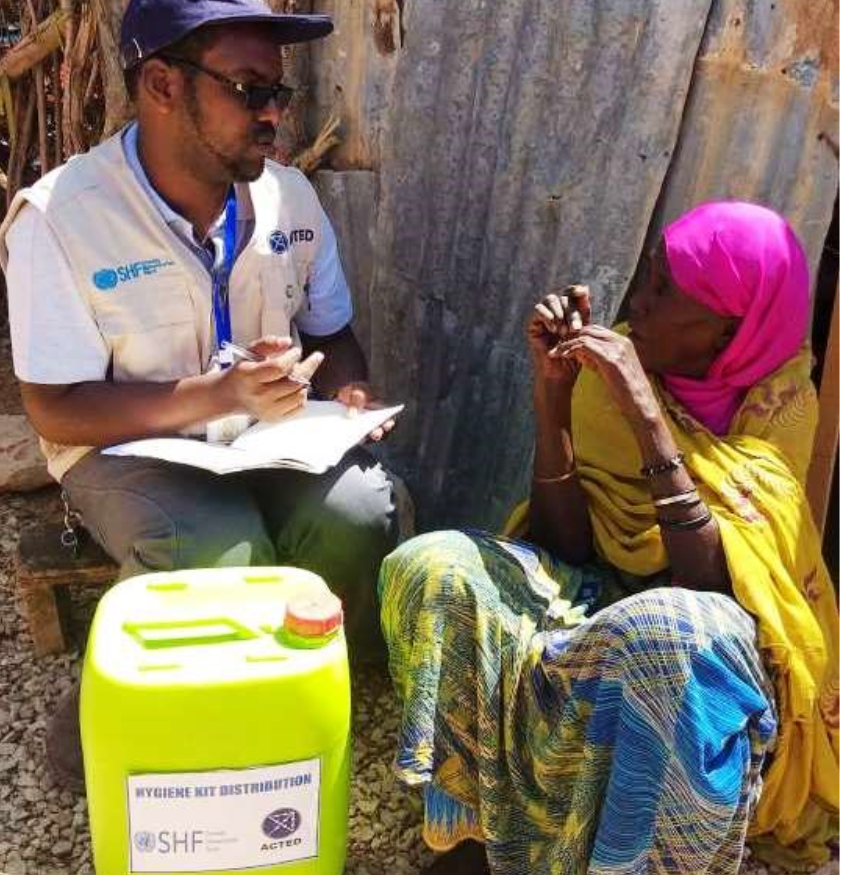Improving hygiene and sanitary conditions in IDP camps
Settlements for internally displaced people (IDPs) are often overcrowded with limited sanitation facilities. Diseases are known to spread easily. IDP families lack both access to water and knowledge of proper hygiene practices like faecal waste handling and proper use of latrines. These poor hygiene and sanitation conditions, combined with the high concentration of people living in camps, increases exposure to diarrheal diseases.
Hawa, a 70-year-old grandmother, has been living in Gumar IDP camp for over three years now after fleeing from recurrent droughts that took a toll on her livestock. She lives in the camp with four of her children and four grandchildren. Before the drought began, Hawa’s family had herds of goats and camels, enough to sustain her large family.
In the face of unforgiving weather conditions, Hawa narrates how she endeavored to save her herds of livestock from the jaws of the drought – moving them from one place to another in search of greener pasture and water. She had used what savings she had and even borrowed money to buy medicine and fodder for her animals.
In an effort to reduce water, sanitation and hygiene related diseases in IDP sites, ACTED with funding from the Somalia Humanitarian Fund (SHF) supported 700 IDP families with highly needed hygiene kits which consisted of two bars of soap, jerricans, aqua tabs, blankets, mosquito nets, solar lanterns and plastic sheets.
In addition to the hygiene kits distribution, ACTED trained community hygiene promoters from the IDP camps to raise awareness on proper hygiene practices. ACTED also organised hygiene promotion sessions to help communities understand fecal-oral bacteria transmission routes and modes of interrupting the spread. The community hygiene promoters used role-plays, demonstrations, group discussions and IEC materials to disseminate the message to communities.
Before we lost our animals to the drought, we had 50 camels, 300 goats and sheep and four donkeys. We depended on our livestock for food and lived happily. We used to sell some of the animals to the local livestock traders and buy food, clothing and medicine. First, water sources dried up and there was no pasture at all. We fled to Gumar IDP site and now we depend on donations from well-wishers and organisations

The distribution of hygiene kits coupled with the community awareness on proper hygiene practices have proven effective as cases of diarrheal and cholera had significantly reduced. IDP families have embraced washing their hands with soap after using the toilet and reduced open defecation. They have started using aqua tabs to purify water making it safe for drinking thus reducing waterborne diseases and other related illness.
My family members learnt proper hygiene and sanitation practices from ACTED’s hygiene promotion sessions. We learnt how to use the aqua tabs for water treatment, cholera prevention and how feaces can reach the mouth and cause diseases. The hygiene kits and the education on hygiene really saved our life. My children no longer have diarrhea and the water we consume is safe
ACTED puts a strong emphasis on good hygiene practices to complement the efforts made to provide safe water and access to sanitation for communities in need. Through participatory hygiene promotion campaigns, the action has brought about a shift in community behavior towards embracing good hygiene and sanitation practices, thus creating safer and healthier environment for communities.